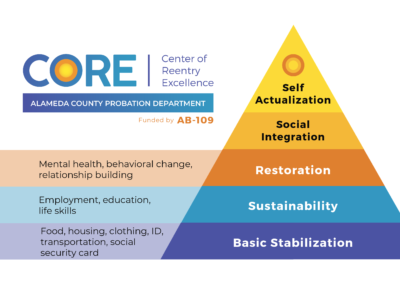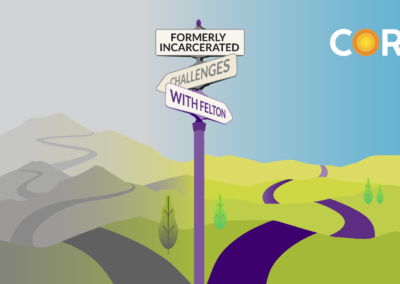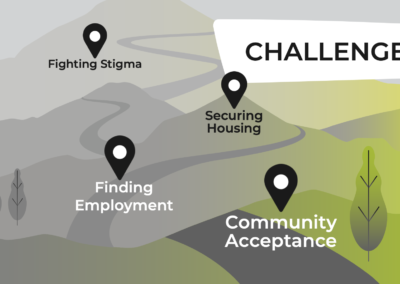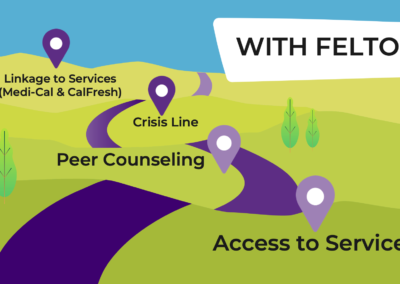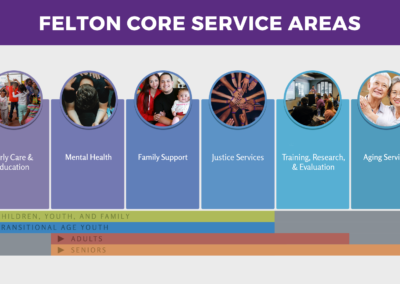In March of 2020, when the first waves of COVID-19 were beginning to wash over California, counties around the Bay went into some form of lockdown – for what was believed to be only a few weeks. Weeks turned to months, turned to over a year of “sheltering-in-place;” outside, businesses shuttered, grocery stores shelves went bare, and bustling streets emptied under red skies.

What isn’t discussed quite as frequently, is the strain the pandemic placed on social services. Shelters closed. Food and clothing service centers closed. Those on waiting lists for aid with agencies responsible for addressing housing insecurity found themselves ineligible when new policies were adopted. This resulted in a sudden and sharp increase in people with limited or no access to food, clothing or housing.
So, when local Bay Area jails and prisons released upwards of 30% of their incarcerated population through various initiatives for health and safety reasons, this was the world to which they returned.
Pre-pandemic, many formerly incarcerated persons would come out with no connections, no safety net, no clean way to transition back into society. With the current situation, the challenges they face are exponentially greater. This is precisely the gap Mona Blake has worked tirelessly to bridge as the program manager of the Center of Reentry Excellence (CORE), a Felton Institute program.
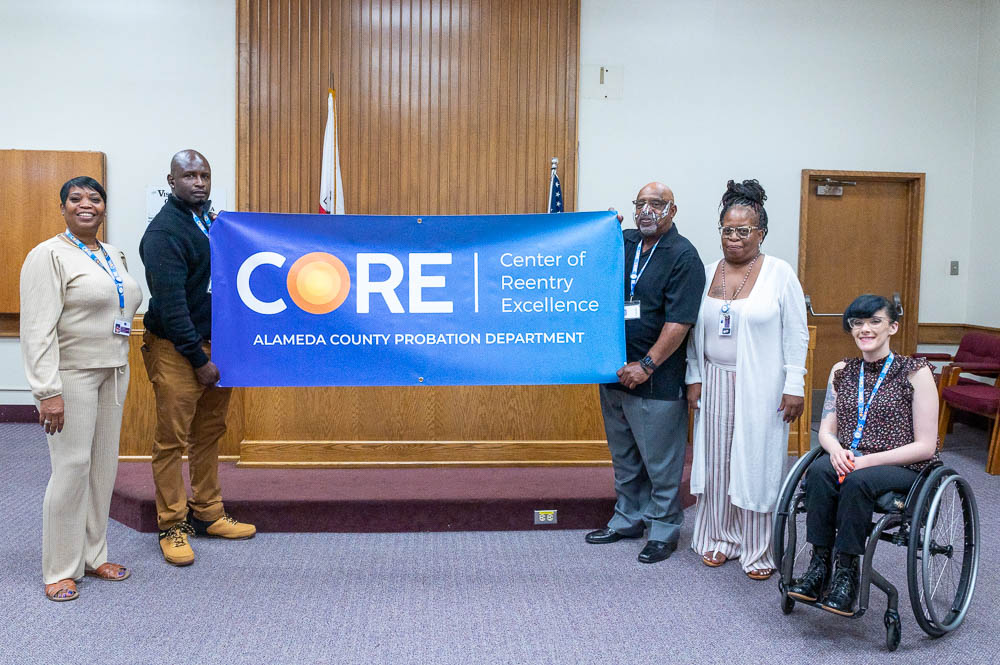
Many women and men who have paid their debt to society, at the completion of their term of incarceration, find returning to life outside of prison walls means limited job and housing prospects, and negligible financial or societal supports. Recidivism rates, in part, reflect how difficult it can be to navigate a crime-free path back. In an article for CalMatters, author Garrett Jensen analyzes a Stanford University study of the California Department of Corrections Male Community Reentry Program; he writes, “As of 2020, about 46% of offenders released in California are reconvicted within three years of release and even more were rearrested.”
CORE’s mission is to provide aid to all justice impacted individuals. Sometimes that means finding a safe place for clients impacted by domestic violence or providing linkages to the Department of Rehabilitation for new skills training. Sometimes it’s getting them food, providing mental health counseling, or rebuilding their confidence with a smile. More than anything it requires an act of faith – believing in each person even if no one else has, acknowledging the journey they’re on, and recognizing the very human moment they are experiencing.
This is evident in the way CORE works according to Mahogony Spears, Alameda County Pretrial Monitoring Unit Supervisor. Working with CORE, “… I was able to secure housing, medical assistance, Social Security, resources for food, and much more for my clients,” she says. “The CORE Program stayed in constant communication… often, I would request the assistance of the CORE staff to help me reconnect with non-compliant clients and they were always available to assist.”
With thousands of incarcerated persons being released and on probation, access to social service severely impacted and limited, and the many COVID restrictions in place, Mona and her team had to be “creative” to get clients access to services and resources. The result, according to Brandy O’Hara, a Deputy Probation Officer (DPO) for Alameda County, is an excellent relationship between them, the clients, and DPOs. “My caseload specifically benefitted from your services, client engagement, classes and the clothing closet,” she says. “Often, clients come to CORE for the great rapport and support they received from your [Felton] staff.”
Thanks to the efforts of the CORE team, the success stories are numerous, having served over 1,500 clients to date – clients who would have otherwise been left without any sort of safety net, have found pathways to renewed relationships and societal engagement.
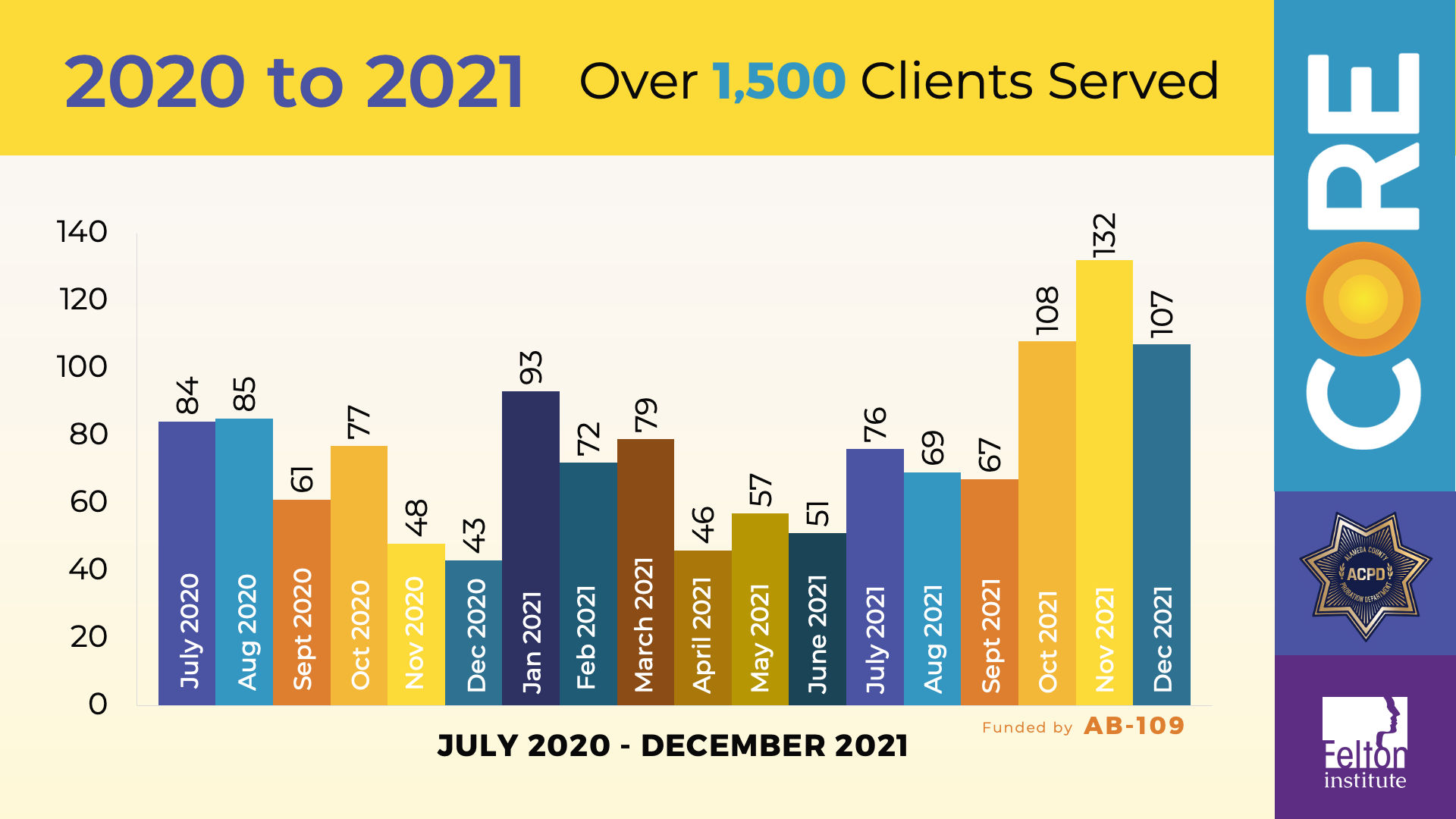
Speaking with Mona, shadowing her, it’s clear she understands something most miss about people – humanity is rebuilt one person at a time. When asked why she would take this work on and during this time of the pandemic, she replied simply, “Because it needs to be done.”
“I feel comfortable in my own skin, I can come in here feeling bad but leave uplifted, this program does so much for me in my heart… Here I am with a job, paying taxes, roof over my head, a few cars, I own my own business – none of that would be possible if I didn’t use this place and the resources this place has, to put me in the position to obtain those things. Because that’s what’s important… positioning.”
“I’ve been able to walk in and find direct resources for housing, employment, food and MediCal, basically anything I’ve needed I’ve been able to come and get referred. Through the CORE program I’ve been able to have a safety cushion while I search for employment, receive employment and go to that employment.”
“The CORE program allowed me to have food on a regular basis. [They] also helped me with getting a refrigerator; my refrigerator was down… They started off by giving me food once a month, after that they showed me how to do the paperwork to get my card and now, I get my own food stamps.”
“They helped me understand there’s people out there to help you.”
“The CORE Program has afforded me as well as the Deputies the opportunity to case conference and create case plans to better support the clients. Additionally, the CORE Program provides support to clients that are not eligible for their program and refer them out to other programs. The customer service, resources, and services provided by the CORE Program are exceptional.”
by J. Elliott Mendez
Implementation of the Center of Reentry Excellence (CORE)program was initiated by Contractor first quarter of 2020 while addressing governmental work restrictions and worker concerns that heightened challenges in behavioral health staffing. Working around these COVID environmental barriers, Felton successfully served approximately 600 individuals’ reentering the community with needed social and mental health services, as well as supplemental referrals for housing, employment, and other critical needs.

Funding Statement: This work is supported by the Alameda County Probation Department, funded by AB109 dollars, as part of the Reentry Engagement Center Master Contract No. 901780.
About Felton Institute: Rooted in equity, Felton Institute transforms quality of life and promotes social justice to accelerate community led change. Felton Institute is a tax-exempt organization registered 501(c)(3) nonprofit under EIN 94-1156530.
Offering more than 50 acclaimed and honored programs that address homelessness, mental health, prenatal, adolescent, adult and senior needs, Felton Institute provides evidence-based behavioral health and social services in San Francisco, Alameda, San Mateo, Marin, and Monterey counties.
Felton Institute can trace its roots back to 1889. The organization is named for its social services pioneer and executive director Dr. Katharine “Kitty” Felton who was called the “conscience of San Francisco” and was committed to ensuring that children and families in crisis have access to social services and resources in order to help them build upon their inherent strengths and develop self-sufficiency. www.felton.org
